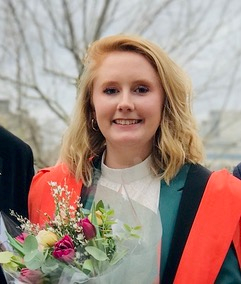Aoife_LongBio
 Aoife O’Byrne
Aoife O’Byrne
ESR 5- Study the molecular and cellular features of human lymph node T cells during the earliest phases of systemic autoimmunity
Aoife grew up in London undertaking her bachelors at the University of Warwick in Biomedical Science where she developed a passion for immunology and scientific research completing an 8 week research project with Professor Nicholas Dale in her final year. After taking a break from science to explore Central and South America, she obtained an MSc in Immunology from King’s College London in 2018 where she won the award for the Best Overall Performance. During her masters she explored the role of Tumour Necrosis Factor α receptors on CD4+ T cells in anti-TNFα therapy under the supervision of Professor Leonie Taams at the Centre for Inflammation Biology and Cancer Immunology at King’s College London. Whilst on this 6 month research placement, she also contributed to two projects funded by Versus Arthritis that have recently been published (1) (2). Following this Aoife worked with Dr. Esperanza Perucha exploring the effect of cholesterol metabolism on CD4+ T cell cytokine induction and inflammation before embarking on the ARCAID PhD program.
Aoife started her PhD in June 2020 under the supervision of Dr. Lisa van Baarsen and Prof. Niek de Vries. Her project aims to study the molecular and cellular features of human lymph node T cells during the earliest phases of autoimmunity. The project will explore the frequency, phenotype and function of inflammatory, regulatory and exhausted/senescent T cells in lymph node biopsies from healthy individuals, RA-risk patients and established RA patients using state-of-the art technologies. It will also use longitudinal analyses to determine whether skewed T cell differentiation towards a proinflammatory or exhausted phenotype is associated with sustained B cell help and how this contributes to disease progression.
- Povoleri GAM, Lalnunhlimi S, Steel KJA, Agrawal S, O’Byrne AM, Ridley ML, Kordasti S, Frederiksen KS, Roberts CA, Taams LS. Anti-TNF treatment negatively regulates human CD4+ T cell activation and maturation in vitro but does not confer an anergic or suppressive phenotype. European Journal of Immunology, March 2020.
- Ridley ML, Fleskens V, Roberts CA, Lalnunhlimi S, O’Byrne AM, Alnesf A, Steel KJA, Povoleri GAM, Sumner J, Lavender P, Taams LS. IKZF3/Aiolos is associated with, but not sufficient for, the expression of IL-10 by CD4+ T cells. Journal of Immunology, 2019. Under review.